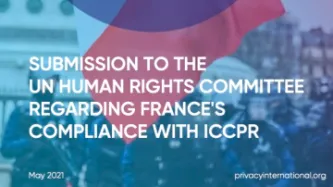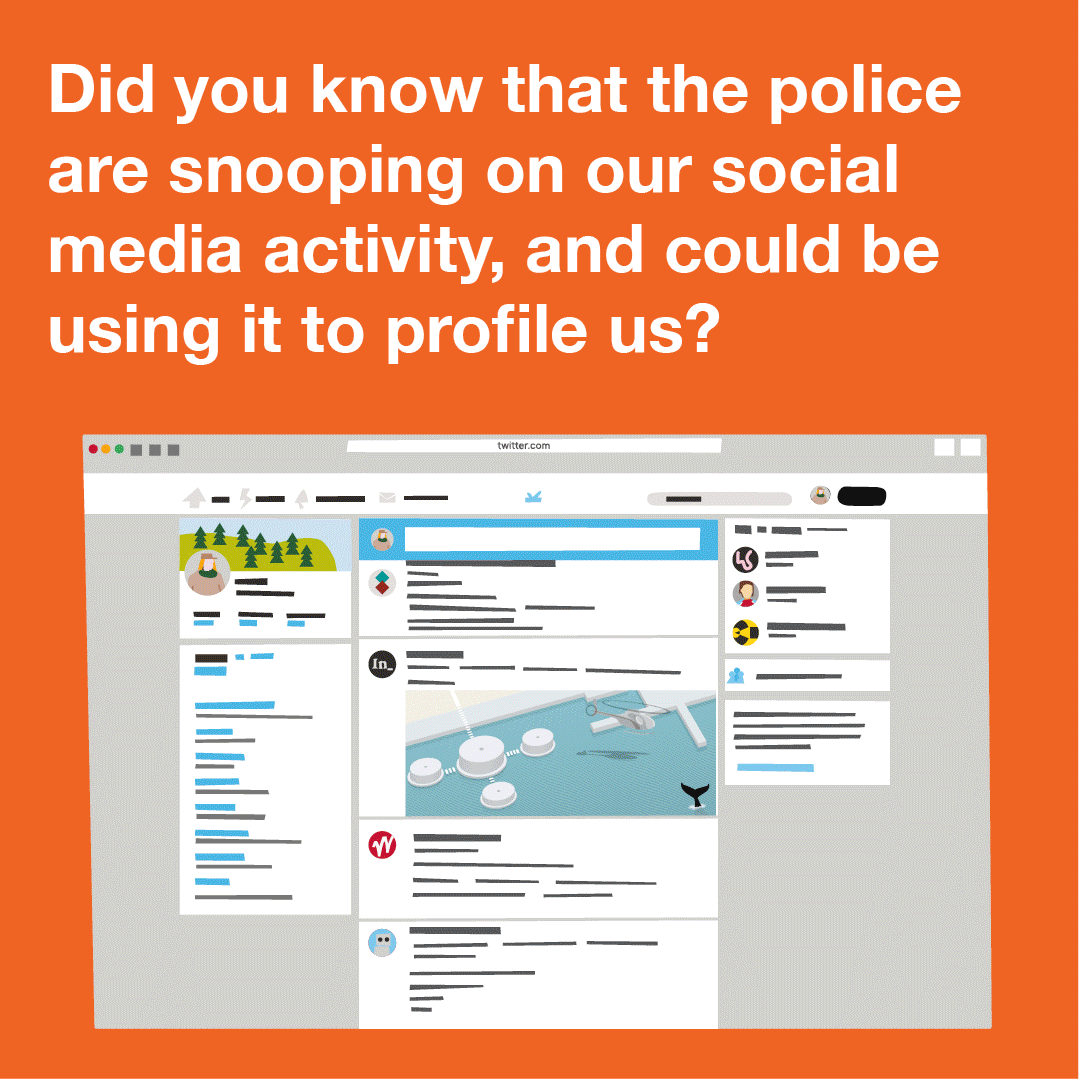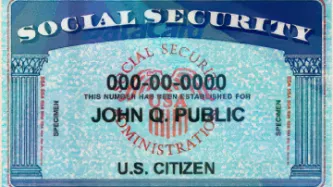Search
Content type: Advocacy
Privacy International (PI) welcomes the opportunity to provide input to the forthcoming report the Special Rapporteur on contemporary forms of racism, racial discrimination, xenophobia and related tolerance to the 56th session of Human Rights Council which will examine and analyse the relationship between artificial intelligence (AI) and non-discrimination and racial equality, as well as other international human rights standards.AI applications are becoming a part of everyday life:…
Content type: Advocacy
Dejusticia, Fundación Karisma, and Privacy International submitted a joint stakeholder report on Colombia to the 44th session of the Universal Periodic Review at the UN Human Rights Council.Our submission raised concerns regarding the protection of the rights to freedom of expression and opinion, to privacy, and to personal data protection; the shutdown of civil society spaces; protection of the right to protest; and protection of the rights of the Venezuelan migrant and refugee population.…
Content type: Examples
Even though schools are back in session in person, their teachers can still monitor the screens on their school-issued devices via software such as GoGuardian. In a new report from the Center for Democracy and Technology, 89% of teachers say their schools will continue to use student-monitoring software, up from 84% in 2021, raising worries about how the data will be used in a climate increasingly hostile towards abortion and LGBTQ+ issues.
CDT also reports that 44% of teachers say that at…
Content type: Examples
A new report from the education news site The 74 Million finds that in-school digital surveillance programs are flagging LGBTQ+ content as "pornographic". For example, Gaggle, comprehensive monitoring software implemented in the Minneapolis public school system, has led administrators to notify parents that their children's submissions have been flagged, without context, for mentioning suicide, gay, and lesbian. Democratic senators Elizabeth Warren (D-MA), Ed Markey (D-MA), and Richard…
Content type: Advocacy
En mai 2021, nous avons fait une soumission pour la 132ème session du Comité des droits de l’homme qui a eu lieu entre le 28 juin 2021 et le 23 juillet 2021 en relation avec la conformité de la France avec le Pacte international relatif aux droits civils et politiques (PIDCP) avant l’adoption de la liste de points à traiter avant présentation de rapports (LoIPR).
Nous avons appelé le Comité des droits de l’homme de l’ONU à inclure dans la liste des questions au gouvernement français les points…
Content type: Advocacy
On May 2021, we made a submission for the 132nd Session of the Human Rights Committee that took place between 28 June 2021 and 23 July 2021 in relation to France’s compliance with the International Covenant on Civil and Political Rights (ICCPR) before the adoption of the List of issues prior to reporting (LoIPR).
We called the UN Human Rights Committee to include in the list of issues to the French government the following:
Emergency measures taken in response to the Covid-19 pandemic, and…
Content type: Examples
Protesters in Tunisia have faced hate messages, threats, and other types of harassment on social media, and been arrested when they complain to police. Arrests and prosecutions based on Facebook posts are becoming more frequent, and in street protests law enforcement appears to target LGBTQ community members for mistreament. In a report, Human Rights Watch collected testimonies to document dozens of cases in which LGBTQ people were harassed online, doxxed, and forcibly outed; some have been…
Content type: News & Analysis
This blog post by Coding Rights was originally published in Portuguese at: https://tinyurl.com/mediumcodingrightsTransID. It was written by Mariah Rafaela Silva and Joana Varon and translated by Erly Guedes. Illustration was produced by Clarote.On the International Transgender Day of Visibility, Mariah Rafaela Silva and Joana Varon authors of the report “Facial recognition in the public sector and trans identities: techno-politics of control, surveillance and threats to gender diversity…
Content type: Long Read
This report is available in English.
La mayoría de los documentos nacionales de identidad y demás documentos emitidos por autoridades estatales incluyen un marcador de género. Estos marcadores suelen recibir el nombre de “marcador de sexo” aunque este término no sea preciso. La presencia de dichos marcadores, especialmente en los certificados de nacimiento, promueve el énfasis de nuestra sociedad en el género como criterio de asignación de identidades, roles y responsabilidades sociales. Al…
Content type: Long Read
Este informe está disponible en español.
Most national ID or identifying documents include a gender marker. This is often known as a 'sex marker,' even though the term is inaccurate. The presence of such markers, especially on birth certificates, contribute to our society’s emphasis on gender as a criterion for assigning identities, roles and responsibilities within society. With gender being such a determining and dominant identifier, it puts it at the centre of so many arrays of our…
Content type: Explainer
At first glance, infrared temperature checks would appear to provide much-needed reassurance for people concerned about their own health, as well as that of loved ones and colleagues, as the lockdown is lifted. More people are beginning to travel, and are re-entering offices, airports, and other contained public and private spaces. Thermal imaging cameras are presented as an effective way to detect if someone has one of the symptoms of the coronavirus - a temperature.
However, there is little…
Content type: Advocacy
TEDIC, InternetLab, Derechos Digitales, la Fundación Karisma, Dejusticia, la Asociación por los Derechos Civiles y Privacy International acogen el llamado de la Relatoría Especial sobre Derechos Económicos, Sociales, Culturales y Ambientales (DESCA) de la Comisión Interamericana de Derechos Humanos (CIDH) de enviar información para la elaboración del Informe Anual sobre DESCA del año 2019, que se presentará ante la Organización de los Estados Americanos (OEA) en 2020.
El objeto de este…
Content type: Advocacy
TEDIC, InternetLab, Derechos Digitales, Fundación Karisma, Dejusticia, Asociación por los Derechos Civiles and Privacy International welcome the call made by the Special Rapporteurship on Economic, Social, Cultural and Environmental Rights (ESCER) of the Inter-American Commission on Human Rights (IACHR) to inform the preparation of the Annual Report of the ESCER for the year 2019, which will be presented to the Organization of American States (OAS) during 2020.
This submission aims to outline…
Content type: News & Analysis
Earlier this month, Brunei attracted international condemnation for a new law that will make gay sex punishable by death. While this is clearly abhorrent, Brunei is not the only country with explicit anti-gay laws.
Homosexuality is criminalised in over 70 countries around the world. And even in countries where gay sex is legal, such as the US, the LGBTIQ+ community still faces discriminatory surveillance and profiling by law enforcement agencies.
Through using the Internet and mobile apps,…
Content type: Explainer graphic
You can also read a more detailed explainer about social media intelligence (SOCMINT) here.
Content type: Examples
In July 2018, Facebook announced it was investigating whether the Boston-based company Crimson Hexagon had violated the company's policies on surveillance. Crimson Hexagon markets itself as offering "consumer insights". Its customers include a Russian non-profit with ties to the Kremlin, and multiple US government agencies. After pressure from civil liberties groups, Facebook put a policy in place in March 2017 barring the use of members' data for the purposes of government surveillance.…
Content type: Long Read
The Privacy International Network is celebrating Data Privacy Week, where we’ll be talking about how trends in surveillance and data exploitation are increasingly affecting our right to privacy. Join the conversation on Twitter using #dataprivacyweek.
It is often communities who are already the most marginalised who are at risk because of the privacy invasions of data-intensive systems. Across the globe, we see the dangers of identity systems; the harms of online violence against women and the…
Content type: Impact Case Study
What happenedSince the late 1980s governments across the world have been trying to build identity registries. By the early 1990s, there were similar policies being pursued by a number of governments across the Pacific region, with similar technologies from the same companies. In the mid-90s ID cards became a ‘modern’ policy, implementing smart cards. By 9/11 biometric IDs became the preferred solution to undefinable problems. Then came vast databases of biometrics to identify people — with…
Content type: News & Analysis
Written by Datos Protegidos
04:16: Carolina can´t sleep. She grabs her mobile from the nightstand next to her bed to check her WhatsApp notifications and read some tweets. She decides to disconnect to and tries to go back to sleep.
07:00: Carolina is woken by her mobile phone alarm. She picks it up and checks her social networks and messages again. To her astonishment, she finds a message in a WhatsApp group from her former college classmate Pablo at 5:25 asking if anyone was still…
Content type: News & Analysis
Written by Privacy International
08:27: Jen gets on the London Underground to go to work. She uses her contactless debit card to pay for the tube, so Transport for London knows where she is travelling to and from and her bank knows when she takes the tube.
08:36: The public WiFi on the tube means that even when Jen doesn’t connect to it, her every step inside the underground is tracked. The data will eventually be sold to advertisers.
08:58: Jen arrives at work. As with all the lower…
Content type: Explainer
What is SOCMINT?
Social media intelligence (SOCMINT) refers to the techniques and technologies that allow companies or governments to monitor social media networking sites (SNSs), such as Facebook or Twitter.
SOCMINT includes monitoring of content, such as messages or images posted, and other data, which is generated when someone uses a social media networking site. This information involves person-to-person, person-to-group, group-to-group, and includes interactions that are private and…















